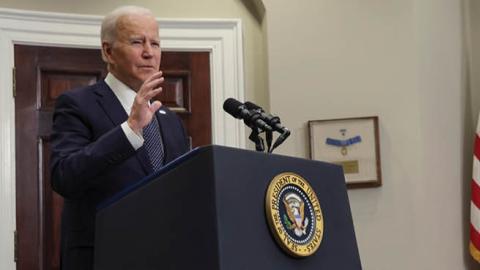The Ukraine crisis has entered a phase of maximum danger. In an address to the nation Monday night, Russian President Vladimir Putin announced the recognition of the Donetsk and Luhansk regions of eastern Ukraine as independent states.
This spells an end to the Minsk agreements, which sought to pacify the eight-year war by granting the two separatist regions an element of autonomy following internationally supervised elections. Through Minsk, Putin had hoped to gain a veto over Ukraine’s political orientation and foreign policy.
By abandoning Minsk, Putin is signaling war. He no longer believes that agreements can deliver him his real prize, Kyiv. Instead, he has moved to recognize the rebel provinces, the first step in a new phase of aggression against the rest of the country. In fact, Monday’s decision is best understood as a pretext for a large-scale invasion in what may be the bloodiest war Europe has suffered in decades.
The coming weeks will serve as a foreign-policy test of the Biden administration rivaled only by the August withdrawal from Afghanistan. If it is to emerge successful, the White House must embrace two simple but essential truths of Russia policy: Putin is in conflict with us, and he only respects strength.
While the United States talks of off-ramps, de-escalation and the path of diplomacy, Putin is prosecuting a multifaceted war against the West. He announced his hostility at the Munich Security Conference in 2007 and opened the conflict with a major cyberattack against Estonia later that year. After the subsequent invasion of Georgia, annexation of Crimea, conflict in Donbass, intervention in Syria, blockade of Ukraine, hybrid attacks across the West, including the use of chemical weapons in assassination operations in the United Kingdom, and now recognition of Donetsk and Luhansk, it is beyond time for the West to abandon hopes for partnership.
In public, the Biden administration has struck a resolute tone that matches the U.S. public sentiment of Putin as a villain. But its strategy of outreach to Moscow has been hiding in plain sight. Over the past several weeks, the Biden team has boasted at every turn of its close coordination with Europe. At the same time, French President Emmanuel Macron has engaged in a whirlwind diplomatic effort to pressure Ukraine into considering concessions.
By putting forward the French, the administration has insulated itself from charges of weakness while ceding the spotlight to a publicity-loving Macron. By Monday, Putin was claiming that the Frenchman had even informed him of a change in the U.S. position on Russia’s demands. Irrespective of Putin’s claims, it is undeniable that President Joe Biden has led a chorus of Western leaders in dismissing Ukraine’s NATO prospects for the foreseeable future.
None of these concessions will sway Putin. The Russian catalog of demands, reiterated last week, are so absurd that they can only be considered a pretext for invasion. Putin is not interested in negotiating with the West but in humiliating it. In that context, it was a mistake for the White House to agree, as it did in principle, to a summit between the two presidents mere hours before Putin announced the recognition of Donetsk and Luhansk.
Worse, the initial U.S. response to Putin’s recognition of Donetsk and Luhansk leaves much to be desired. Rather than targeting decision-makers in Moscow, the Biden team is limiting its economic sanctions to the two regions. This is anything but the “swift and decisive” response the U.S. secretary of state promised as recently as the weekend and suggests America is comfortable with a war that goes so far but no further. More likely, the move will embolden Putin.
During Monday’s meeting of the Security Council of Russia, its deputy chairman, former President Dmitry Medvedev, observed that Russia’s invasion of Georgia, which also included the recognition of two provinces, led to no firm response from the West. The lesson, he concluded, is that the West will once again stand by, since “Russia is more important than Ukraine.” It’s time for the Biden administration to prove otherwise.
Read in New York Post














